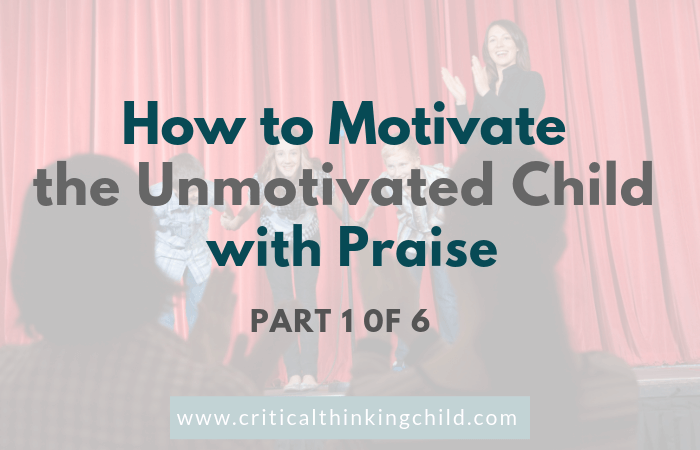Motivating your child can feel like a challenging task. When your child is unfocused, frustrated, or overwhelmed it can be difficult to encourage them to become excited and interested. We have good news for you: your child can become motivated to focus on their goals, and it doesn’t have to be hard.
It’s rare to find a child that is completely self-motivated, and even the most motivated children (and adults) have days when getting started can be a challenge. And while a single unmotivated day won’t cause much harm, when a lack of motivation continues long enough it becomes a trend, it can lead to behavioral issues and gaps in learning. That said, all children have the potential to work hard and engage given the right forms of motivation.
Over the next few months, we’ll explore a variety of ways in which children can be motivated. These various techniques address different motivation styles of children. Your own child may respond to some better than others, but each one is a new tool in your toolbox.
First, we’re going to focus on the concept of praise as a motivator. We’ll cover what praise is (and what it isn’t), when to use it, and how it can help your child. Praise may seem like a simple concept, but it’s far more complex than simply telling your child “great job!” or “I like the way you did that.”
When motivating with praise, be specific
For praise to be effective, it must be specific. Instead of “Great job reading,” try to call out what, exactly, was great about their efforts. For example, you could say, “I noticed that you read the word ‘beach’ at first based on the picture, but then looked at the first letter and realized that word was ‘ocean.’ I like the way you went back to fix your reading.”
Praising behavior works much the same way. Instead of saying “I love how well-behaved you are,” make sure the child knows specifically what “well-behaved” means. You could say something like, “I noticed you looked at the speaker and raised your hand to be called on. That really showed respect for the speaker and your classmates.”
Specific praise works for two reasons. First, it shows the child that you have taken the time to think about what they are doing well. They feel noticed and paid attention to. Second, specific praise reinforces specific behaviors that you want to see more of.
Praise your child’s effort rather than outcome
In addition to giving specific praise, it’s also helpful to praise your child’s effort, rather than the results. For example, a child may have gotten a high score on a math test and worked hard for weeks to prepare. Instead of saying “Wow, that’s your first perfect score! Great job,” try saying “I noticed you really worked hard to prepare for this test. It really paid off! Are you proud of yourself?”
This type of praise will work to develop intrinsic motivation in children, since they will see their hard work measurably leading to a better outcome. Educators and parents have placed an increasing emphasis on effort since embracing the concept of developing a growth mindset. Carol Dweck, whose research has led the way in growth mindset, asserts that ability is not innate and can be changed with increased effort. Praising effort instead of achievement can certainly help with this!
Praise sincerely
Be sure that your praise is sincere. Even young children can sense when praise is forced, so make sure you’re looking for something specific and delivering the praise in an authentic manner. Avoid high pitched tones, increased volume, or over-the-top empty praise like “WOW! Such a good girl!” Talk to the child like a peer, be honest and genuine, and your child will know the difference.
Praise with high expectations in mind
Perhaps the most challenging aspect of praise is figuring out what to praise and what to let go. It’s easy to praise every little thing a child does, especially when you’re learning how to deliver specific praise, but it’s actually best to only praise exceptional effort. For example, some parents will thank children for doing chores that are expectations, but over-enforcing expected behavior leads children to expect praise for everything that they’re already supposed to be doing. Instead, praise behavior that goes above and beyond the expected, like “I noticed that you comforted your sister when she was crying even though you were also upset. That shows that you really care about her.”
You can tie praise into academic goals and make sure you’re only praising work that contributes to the goals. Talk to the teacher to determine the next academic goals your child is aiming to reach and praise based on that (you can also refer to your own academic success monitoring or your child’s test scores for this). When students know you’ll praise them for everything they do, they will do less. However, if you praise them for working harder than they ever have, that’s what you’ll get.
Praise: A method of motivating children to succeed
While not all children will respond the same way to praise, incorporating specific, sincere praise into your routine will certainly help them feel more confident and motivated. Give it a try the next time your child puts in some extra effort and see how they respond.




Thank you for this education. I had praise l wrong. Can’t wait to try this concept instead.
You’re welcome. We’ll discuss additional motivation strategies as well. I have no doubt your nailing at least one of the strategies.